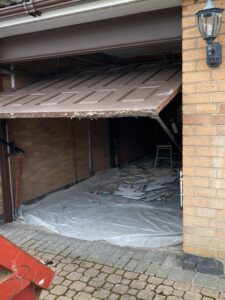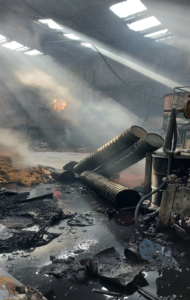Farmer fined after dog walker thrown 8ft into the air and trampled by cow
A DOG walker was thrown 8ft into the air by a cow which then repeatedly trampled on him as he tried to crawl away, breaking six ribs of his ribs and leaving him with damage to his lungs and spleen.
Steve Adams, from Coleshill, Warwickshire, was on holiday with his wife Jane near Sidbury, East Devon when they went for a walk with their Springer Spaniel, named Lisa.
They were walking along a public footpath through a field containing cows with calves when one of the cows attacked, leaving Steve badly injured. He spent seven days in intensive care.
The farmer responsible for the cattle has been ordered to pay a fine and costs totalling more than £3,500.
Farmers should not put cattle with young calves in fields with a public right of way. The Health and Safety Executive (HSE) has advice for farmers, landowners and other livestock keepers on dealing with the risks posed by cows with calves.
Steve, who is now 63, and is a dad of three with two grandchildren, is retired from the transport industry. He said: “My own grandfather was a farmer, so I’d been around cattle as a child, and I wasn’t scared of them. Now, I wouldn’t go into a field with cows, you don’t know what’s going to happen. People should be very wary of cows.”
Steve and Jane were on holiday at the East Devon caravan and motorhome campsite in July 2021 when they decided to go for a walk with their dog, which was on a lead.
Their route took them from a pub through fields. As they headed towards a pedestrian gate at the edge of one of the fields, they came to an electric fence surrounding the fields edge.
They were then surrounded by more than 20 cattle, some with calves. A cow approached, lowered its head and tossed Mr Adams into the air. It then trampled him on the ground until he managed to crawl away.
A HSE investigation established that cattle with young calves were being kept in a field with a public right of way across it. Cattle with young calves are known to be protective and unpredictable, and can pose a risk to walkers, especially to those with dogs. Farmers should not put cattle with young calves in fields with a public right of way.
Steve Adams said: “It was just the one cow, the biggest one. It came up and threw me into the air with its head and then it trod all over me. I was trying to crawl out of the way, but it just kept landing its hooves on me.
“The dog was on its lead and I’d managed to let it go and it made it away. My wife had one of those plastic ball throwers for the dog and she was hitting the cow with it but it made no difference at all. I managed to roll away from under it.
“I wasn’t feeling too good at all, I couldn’t breathe. It had taken us about 15 minutes to walk to where it happened, but it took us about two and half hours to make it back to the van. An ambulance was called to the site and they said straight away that I’d broken my ribs. It was a pretty scary day.
“I don’t walk too much now. I’m not as healthy as I was, and I can still feel my injuries now.”
Barry Fowler, of Sidbury, Sidmouth, pleaded guilty to breaching Section 3(2) of the Health & Safety at Work etc Act 1974 and was fined £555 and ordered to pay costs of £3,000 at Exeter Magistrates’ Court on 8 March 2023.
HSE inspector Simon Jones said: “The serious injuries to Mr Adam sustained when he has attacked and trampled by cattle with their calves was totally preventable.
“Cattle are extremely protective of their calves and even calm cattle can become aggressive if they think the calves may, in any way, be threatened, even by members of the public walking past.
“Farmers should not place cattle with calves in fields where members of the public have a legal right to walk unless appropriate measures are in place such as robust fencing separating cattle from people. Had Barry Fowler done this then the incident could not have happened.”
Notes to Editors:
- The Health and Safety Executive (HSE) is Britain’s national regulator for workplace health and safety. It aims to reduce work-related death, injury and ill health. It does so through research, information and advice, promoting training; new or revised regulations and codes of practice, and working with local authority partners by inspection, investigation and enforcement. www.hse.gov.uk[1]
- More about the legislation referred to in this case can be found at: www.legislation.gov.uk/ [2]
- HSE news releases are available at http://press.hse.gov.uk[3]

 An investigation carried out by the Health and Safety Executive (HSE) found that Asbestos Boss Limited had never held a licence and their poor working practices resulted in the large scale spread of asbestos and exposure to homeowners and their families. Little to no precautions were taken by Asbestos Boss Limited and so their own workers, as well as anybody at the premises they were working on, were at serious risk of exposure to asbestos. The company and their director also breached a prohibition notice on several occasions.
An investigation carried out by the Health and Safety Executive (HSE) found that Asbestos Boss Limited had never held a licence and their poor working practices resulted in the large scale spread of asbestos and exposure to homeowners and their families. Little to no precautions were taken by Asbestos Boss Limited and so their own workers, as well as anybody at the premises they were working on, were at serious risk of exposure to asbestos. The company and their director also breached a prohibition notice on several occasions.

